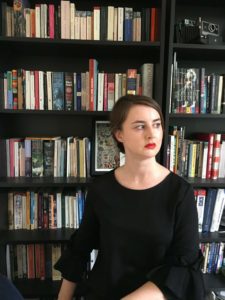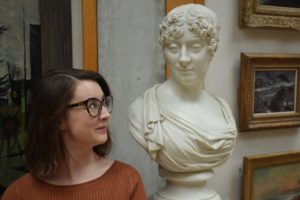In the latest of our Northern Roots series, where we speak to people originally from Northern Ireland but currently living elsewhere, our interviewee is Danielle Thom. You can follow Danielle on Twitter @Danielle_J_Thom.
1. Tell us about yourself. When did you leave Northern Ireland, and where did you go? What do you do now?
I didn’t get much choice in the matter of leaving Northern Ireland – I was a child! My parents decided to move to London in the late 1980s, and I effectively grew up here, around Eltham in south London; although we went back to Belfast every summer to visit family.
That probably explains why I’ve never really lost my accent; cue decades of English people asking me to say ‘how now brown cow’! We moved in part because work was hard to come by in ‘80s Belfast, and my dad had the offer of a job over here; and partly because as a ‘mixed marriage’; my Protestant father and Catholic mother got a fair amount of abuse and intimidation, and didn’t want that future for their children.
Today, I’m a curator and art historian. I earned my PhD a few years ago, specialising in 18th century art, and after working at the V&A I’m now the Curator of Making at the Museum of London: I look after decorative and applied arts, including jewellery, ceramics and sculpture.
2. What do you think when you see the Northern Ireland of today, in the news and on social media?
I think there’s a disconnect between the Northern Ireland you see on the news, and the real Northern Ireland. Since the signing of the Good Friday Agreement and the de-escalation of the Troubles, it features less and less regularly on the national news, to the point that many British people are utterly unfamiliar with the place, its politics and history. But when it does feature, all you see are political extremes which don’t really represent day-to-day life here.
The recent DUP deal was a case in point: suddenly, the British press and people on social media were agog with horror and surprise at many of the values which the DUP represent, as if they’d never heard of them before.
On the plus side, there is increasing attention being paid to aspects of Northern Irish culture. If you’re into golf, for example, Rory McIlroy seems to have done a lot to generate positive coverage; while the food scene – which has really developed in the last decade – gets good national press.
3. Are you hopeful for Northern Ireland’s future? Will Brexit make a difference?
This is a vexed question, and I am worried about the impact of Brexit. It’s enraging that nobody in Westminster really thought through the implications of the Irish border before calling the referendum last year.
The best case scenario is that we manage to retain a ‘soft’ border and negotiate some kind of customs agreement between the North and the Republic; but if any kind of border checks or, God forbid, physical barriers are instituted, it won’t just be an economic disaster, it’ll be a grim backsliding to the darkest part of our history. It will stir up resentment and possibly even violence.
It’s utterly vital that this is got right, because Northern Ireland has made massive strides in the last 20 years.
Every time I come back I’m struck by something new and exciting, like the Ulster Museum refurbishment a few years ago, or the opening of the MAC centre. I can (just about) remember when you had to go through a security turnstile just to go shopping in Belfast, and it’s so much better now. It would be irresponsible to throw that away to score political points.
4. Do you think you will return to Northern Ireland? What could convince you to come back?
I doubt that I will ever come back on a permanent basis, although I visit regularly, especially since my mother moved back to Belfast a few years ago. The fact that it’s only an hour’s flight away helps! But it would be hard to leave a city like London behind, and there are aspects of Northern Ireland that I find a bit parochial and inward-looking. That would be difficult to live with.

5. What can Northern Ireland learn from the place you live now?
London is one of the most diverse, most exciting cities in the world. People of all backgrounds, of different races, classes and cultures live alongside one another, mostly peacefully. While it’s far from perfect, and needs to do more to tackle racial and income inequality, I think London could teach Northern Ireland a lesson in embracing diversity and seeing the value of different perspectives.
There are, regrettably, residual pockets of racism, misogyny and homophobia in the North. The way to stamp that out is through education and social integration.
6. If Northern Ireland had a president with sweeping powers, and it was you, what would you do?
I’d invest in education, and encourage more non-denominational and secular schools. I’d hold regular, 5-yearly referenda on whether or not the people of Northern Ireland wished to become part of a united Ireland, as provided for in the Good Friday agreement.
I’d crack down on sectarian and violence-fuelled symbolism while still allowing people to celebrate their heritage. I’d build proper, Dutch-style cycle paths along all the main roads in Belfast and Derry, to ease the traffic congestion and offer opportunities for exercise and a reduction in pollution. And I’d grant myself free fish and chips for life!
7. What would you like to see more of on Northern Slant?
More photo essays, and maybe in-depth guides to some of the smaller towns and off-the-beaten-track parts of Northern Ireland?

8. If you could ask three Northern Ireland politicians (past or present) to dinner, who would they be? And why?
I’d love to speak to Mary Ann McCracken. Technically she was a political activist rather than an elected politician: a highly educated woman in an age when women couldn’t run for office; an anti-slavery activist, social reformer and friend of the poor, a talented mathematician and musical historian, a businesswoman. And, of course, a fierce republican who supported her brother, Henry Joy McCracken in his attempts to secure an independent Ireland.
I’d invite John Hume, just to shake his hand for everything he’s done.
I’d also invite Nigel Dodds, because he lived next door to my father when they were growing up in Derry in the early 1960s, and apparently the young Nigel pinched one of my dad’s toys, so I’d like to ask for it back.
9. Do you have a favourite quote, or mantra?
I can’t possibly choose just one favourite…
10. What’s your message for people back home?
“Mum, I’ll call you tonight!”
Also published on Medium.
